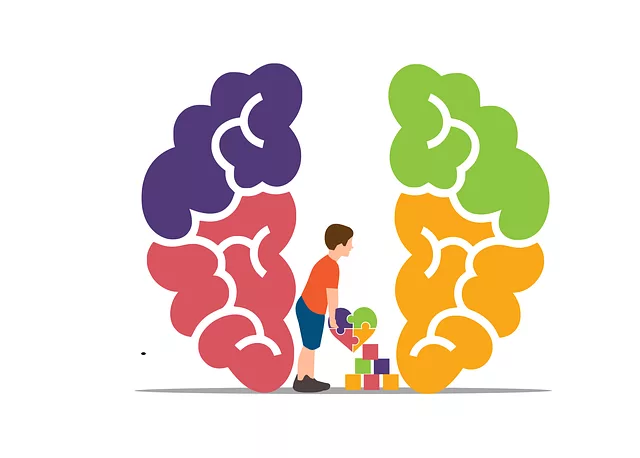Public awareness campaigns led by organizations like the Parker Kaiser Permanente (PKP) mental health department (specific number not provided) are vital for promoting mental wellness and reducing stigma. These initiatives use creative methods such as social media, community events, and storytelling to reach a broad audience, encouraging understanding and support-seeking behaviors. Key focus areas include self-esteem improvement, emotional well-being promotion, and burnout prevention strategies tailored to healthcare providers. An effective campaign involves strategic planning, data-driven messaging, and targeted narratives that resonate with diverse demographics. By leveraging various communication channels and storytelling, these campaigns educate, empower, and connect individuals to resources, fostering a supportive environment for improved mental health. Measuring success is crucial, with PKPMH's innovative multi-faceted plan targeting anxiety relief and policy advocacy leading to increased awareness and access to resources, benefiting numerous individuals seeking support.
Public awareness campaigns play a pivotal role in promoting mental well-being, as evidenced by the successful initiatives of the Parker Kaiser Permanente mental health department. This article explores the art and science of crafting impactful campaigns that can shift societal attitudes and encourage early intervention. We delve into key strategies, from identifying target audiences to utilizing diverse media channels, highlighting techniques that have proven effective in reaching and engaging communities. By examining the approach adopted by Parker Kaiser Permanente, we aim to provide valuable insights for enhancing mental health awareness globally.
- Understanding Public Awareness Campaigns for Mental Health
- Strategies and Techniques for Effective Campaign Development
- Measuring Success: Evaluating the Impact of Parker Kaiser Permanente's Approach
Understanding Public Awareness Campaigns for Mental Health

Public awareness campaigns play a pivotal role in fostering mental health literacy and breaking down stigma. These initiatives, often spearheaded by organizations like Parker Kaiser Permanente’s mental health department (number unknown), aim to educate communities about various aspects of mental wellness. By employing creative strategies, such as social media campaigns and community events, these programs reach a wide audience, promoting understanding and encouraging individuals to seek support when needed.
One key focus area is self-esteem improvement, where campaigns offer practical tips for building resilience and coping with challenges. Additionally, they emphasize emotional well-being promotion techniques that can be adopted by people from all walks of life. Moreover, burnout prevention strategies for healthcare providers are also a significant part of these initiatives, recognizing the importance of mental health within the medical profession.
Strategies and Techniques for Effective Campaign Development

Developing an effective public awareness campaign requires a strategic approach that aligns with the goals of Parker Kaiser Permanente’s mental health department. One key strategy is to leverage data and research to identify target audiences and tailor messages accordingly. By understanding the specific needs and concerns of different demographics, organizations can create compelling narratives that resonate and encourage positive change. For instance, focusing on resilience building among youth through interactive stress management workshops can foster a sense of empowerment and better equip them to navigate mental health challenges.
Additionally, utilizing various communication channels is essential for campaign success. This includes leveraging social media platforms, collaborating with influencers, and partnering with community organizations to amplify messages. Engaging storytelling techniques that highlight real-life experiences can humanize mental health issues and encourage open dialogue. For example, sharing testimonials from individuals who have successfully navigated mental health struggles through mental health awareness initiatives can inspire hope and motivate others to seek support. Remember, a well-rounded campaign should aim to educate, empower, and connect individuals with available resources, ultimately fostering a supportive environment for improved mental well-being.
Measuring Success: Evaluating the Impact of Parker Kaiser Permanente's Approach

Measuring success is a vital aspect of evaluating any public awareness campaign’s effectiveness, especially in the context of mental health initiatives. Parker Kaiser Permanente, renowned for its comprehensive mental health department, has pioneered an innovative approach to raising awareness and promoting well-being. Their strategy involves a multi-faceted communication plan that targets diverse audiences. By employing various channels such as social media, community events, and educational workshops, they ensure widespread reach and engagement.
The impact of this method is significant, as evidenced by the department’s ability to cater to a large number (Parker Kaiser Permanente mental health department) seeking support. The success can be attributed to their tailored Communication Strategies that address specific mental health concerns, including anxiety relief. This approach, coupled with Mental Health Policy Analysis and Advocacy, has led to increased awareness and improved access to resources, ultimately fostering healthier communities.
Public awareness campaigns play a pivotal role in educating communities about mental health, as evidenced by Parker Kaiser Permanente’s successful approach. By employing strategic techniques and measurable evaluations, such initiatives can significantly impact societal perceptions and behaviors towards mental well-being. The article has explored the fundamentals of public awareness for mental health, offering valuable insights into effective campaign development. With a focus on reaching and engaging diverse audiences, these campaigns have the potential to foster open conversations, reduce stigma, and ultimately improve access to support services, benefiting individuals within communities across all demographics, including those served by the Parker Kaiser Permanente mental health department (number not specified).






